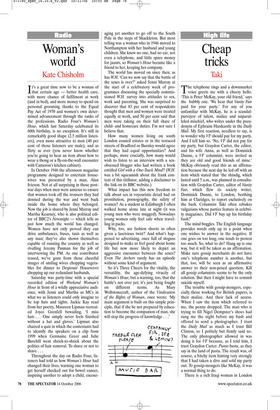Woman’s world
Kate Chisholm
It’s a great time now to be a woman of that certain age — better health care, with more chance of fulfilment at work (and in bed), and more money to spend on personal grooming thanks to the Equal Pay Act of 1970 and women’s own determined advancement through the ranks of the professions. Radio Four’s Woman’s Hour, which last Saturday celebrated its 60th birthday, is no exception. It’s still in remarkably good shape (2.5 million listeners), even more attractive to men (40 per cent of those listeners are male), and as flirty as ever (you never know whether you’re going to hear an item about how to wear a thong or a fly-on-the-wall encounter with Cameron’s kitchen cabinet).
In October 1946 the afternoon magazine programme designed to entertain housewives was presented by a man, Alan Ivieson. Not at all surprising in those postwar days when men were anxious to ensure that women took off the trousers they had donned during the war and went back inside the home where they belonged. Now the job is shared by Jenni Murray and Martha Kearney, who is also political editor of BBC2’s Newsnight — which tells us just how much the world has changed. Women have not only proved they can drive ambulances, buses, taxis as well as any man; they’ve also shown themselves capable of running the country as well as rivalling Jeremy Paxman for the job of interviewing the PM. As one contributor teased, we’ve gone from those cheerful images of smiling wives chopping vegetables for dinner to Desperate Housewives chopping up our redundant husbands.
Saturday was party-time with a special recorded edition of Weekend Woman’s Hour in front of a wildly appreciative audience, with Jenni and Martha as MCs in what we as listeners could only imagine to be top hats and tights. Jackie Kay read from her poetry, Maureen Lipman recreated Joyce Grenfell bewailing, ‘I miss hats ... One simply never feels finished without a hat and gloves.’ Lipman also chaired a quiz in which the contestants had to identify the speakers on a clip from 1999 when Germaine Greer and Julie Burchill went shriek-to-shriek about the politics of hair removal. To shave or not to shave ...
Throughout the day on Radio Four, listeners had told us how Woman’s Hour had changed their lives, warning one woman to get herself checked out for bowel cancer, inspiring another to adopt a child, encour aging yet another to go off to the South Pole in the steps of Shackleton. But most telling was a woman who in 1946 moved to Northampton with her husband and young children. She knew no one, had no car, not even a telephone, and little spare money for jaunts, so Woman’s Hour became like a friend to her, keeping her company.
The world has moved on since then; as has W.H. ‘Can we now say that the battle of the sexes is over?’ asked Jenni Murray at the start of a celebratory week of programmes discussing the specially commissioned W.H. survey into attitudes to sex, work and parenting. She was surprised to discover that 83 per cent of respondents thought that men and women were treated equally at work, and 50 per cent said that men were taking on their full share of childand homecare duties. I’m not sure I believe that.
How many women living on south London council estates or in the terraced streets of Bradford or Burnley would agree that they had equal opportunities? And perhaps, more crucially, how many would wish to listen to an interview with a sexobsessed blogger who had written a book entitled Girl with a One-Track Mind? (W.H. was a bit squeamish about the frank content of this titillator, adding a disclaimer to the link on its BBC website.) What impact has this new freedom to talk about sex in voyeuristic detail had on prostitution, pornography, the safety of women? As a student in Edinburgh I often walked home alone late at night (it was young men who were mugged). Nowadays young women only feel safe when travelling in packs.
Why, too, are fashion shoots so often given a lascivious twist? And what’s happened to advertising, once full of slogans designed to make us feel good about home life but now more likely to depict an aggressive encounter between the sexes? Even The Archers rarely has an episode without some kind of argument.
So it’s Three Cheers for the vitality, the versatility, the age-defying vivacity of Woman’s Hour, but a warning, too, that the battle’s not over yet; it’s just being fought on different terms. As Mary Wollstonecraft, author of the Vindication of the Rights of Woman, once wrote: ‘My main argument is built on this simple principle, that if she be not prepared by education to become the companion of man, she will stop the progress of knowledge ...’


































































































 Previous page
Previous page